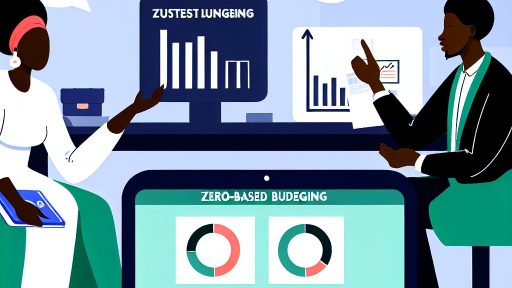Introduction to Budgeting Basics in Nigeria
Budgeting is a critical aspect of financial management in Nigeria.
It enables individuals and families to allocate their resources effectively.
In Nigeria, budgeting helps navigate economic challenges and uncertainties.
Many Nigerians face issues such as inflation and fluctuating income levels.
A well-structured budget serves as a roadmap for financial stability.
Understanding Your Income
The first step in budgeting is understanding your total income.
This includes salaries, business profits, and any additional sources.
List all forms of income to have a clear overview.
Next, calculate the net income after taxes and other deductions.
Doing this will give you a realistic starting point for your budget.
Identifying Essential Expenses
Essential expenses are necessary for daily living.
These include housing, utilities, food, and transportation costs.
Gather information on your average monthly expenses for each category.
It’s essential to differentiate between needs and wants.
This distinction helps in prioritizing spending.
Your Personalized Financial Plan
Get expert financial advice tailored exclusively to your goals. Receive a custom roadmap in just 1-3 business days.
Get StartedSetting Financial Goals
Setting clear financial goals can guide your budgeting process.
Consider both short-term and long-term goals.
Examples of short-term goals include saving for a trip or emergency fund.
Long-term goals might involve homeownership or retirement savings.
Writing down these goals increases accountability and focus.
Tracking Your Spending
Regularly tracking your spending is vital for effective budgeting.
This practice helps identify spending patterns and areas of overspending.
Consider using a mobile app for tracking expenses conveniently.
Some popular apps in Nigeria include Paylater and Expensure.
These tools make it easier to categorize and analyze your spending habits.
Reviewing and Adjusting Your Budget
Periodic reviews of your budget are essential for optimal management.
Identify any discrepancies between your budget and actual spending.
Adjust categories as necessary to reflect changes in income or expenses.
Flexibility in budgeting allows for better financial control.
Unlock a Debt-Free Future with Our Unique Strategies
Imagine a life unburdened by debt—a reality we help you visualize and achieve. We offer personalized strategies tailored to your unique situation, guiding you step-by-step toward financial freedom.
Start TodayRevisiting your budget can lead to more effective financial decision-making.
The Role of Technology in Personal Finance Management
Understanding Technology’s Impact
Technology revolutionizes personal finance management in Nigeria.
It simplifies tracking expenses and income through various tools.
Moreover, technology empowers users with data-driven decision making.
Budgeting Apps and Software
Numerous budgeting apps like Mint and PocketGuard offer user-friendly interfaces.
These apps help manage finances efficiently from one place.
They provide features such as budget tracking and spending alerts.
Subsequently, users can set financial goals and monitor progress.
Online Banks and Financial Institutions
Online banks facilitate easier transactions and higher interest rates.
They often provide budgeting features that traditional banks lack.
Additionally, these banks offer real-time notifications for transactions.
This feature enhances awareness of financial habits.
Digital Payment Solutions
Digital payment platforms like Paystack and Flutterwave simplify transactions.
They enable seamless payments for goods and services online.
Unlock Untapped Nigerian Wealth with Our Expert Advice
Imagine accessing investment opportunities others overlook—stocks, bonds, real estate, small businesses tailored to you. We offer personalized advice you won't find elsewhere, guiding you to financial success.
Unlock WealthThese solutions foster cashless transactions, reducing the need for physical currency.
Educational Resources
Technology provides access to myriad educational resources on finance.
Webinars, online courses, and financial blogs improve financial literacy.
This knowledge equips individuals to make informed financial decisions.
Data Security and Privacy
While using technology, data security remains a top concern.
Many financial apps employ encryption to protect user data.
Users must select reputable platforms that prioritize privacy.
Future Prospects
The role of technology in personal finance management continues to expand.
Emerging technologies like artificial intelligence will enhance budgeting tools.
Ultimately, these advancements will lead to better financial outcomes for users.
Popular Budgeting Apps Available in Nigeria
Comprehensive Overview
Budgeting apps provide effective solutions for managing finances in Nigeria.
These apps simplify the process of tracking spending and saving.
They offer various features tailored to users’ needs.
Top Budgeting Apps
Several budgeting apps cater to the Nigerian market.
Each offers unique functionalities and advantages.
Expensure
Expensure allows users to track daily expenses effortlessly.
It provides insights into spending habits and offers tailored budgeting advice.
Money Manager
Money Manager helps users with income tracking and expense categorization.
This app offers a simple interface, making budgeting easy for everyone.
Wallet
Wallet enables users to plan their budgets effectively.
It features options for setting financial goals and monitoring progress.
Spendee
Spendee integrates bank accounts for real-time expense tracking.
Users can create budgets based on their financial habits.
Choosing the Right App
Selecting the best budgeting app requires considering your financial needs.
Evaluate features, user interface, and compatibility with your devices.
Additionally, look for apps that offer local currency support.
Benefits of Using Budgeting Apps
Budgeting apps promote financial discipline among users.
They facilitate better spending habits and savings accumulation.
Moreover, they provide a clearer picture of financial health.
Discover More: How to Build a Budget That Fits the Nigerian Lifestyle (And Sticks)
How to Effectively Use Mobile Banking for Budgeting
Setting Up Your Mobile Banking App
First, download a reliable mobile banking app.
Popular options include Access Bank, GTBank, and Zenith Bank.
Next, register and create your account securely.
Use strong passwords to protect your financial information.
After registration, familiarize yourself with the app’s features.
Tracking Your Expenses
Utilize the expense tracking feature in the app.
Categorize your spending for better insights.
Regularly review your expenditures to identify unnecessary costs.
Set alerts for when you exceed specific budget limits.
Creating a Budget
Access the budgeting tools offered by the app.
Input your income to determine available funds.
Create budget categories such as groceries, transportation, and entertainment.
Allocate realistic amounts to each category based on your lifestyle.
Setting Savings Goals
Establish savings goals within the mobile app.
Determine a target amount and a timeframe for your goals.
Track your progress regularly to stay motivated.
Adjust your budget if needed to meet your savings goals.
Making Payments and Transfers
Use the app for quick and secure bill payments.
Schedule payments to avoid late fees and penalties.
Transfer money between accounts instantly when necessary.
Utilize the QR code feature for fast transactions with vendors.
Reviewing Financial Reports
Regularly analyze the financial reports provided by the app.
Look for trends in your spending habits over time.
Use these insights to refine your budget as needed.
Make adjustments to categories where you overspend.
Ensuring Security
Always enable two-factor authentication for extra security.
Regularly update your passwords and avoid sharing them.
Monitor your account for unauthorized transactions immediately.
Contact your bank immediately if you notice any suspicious activity.
Explore Further: Mastering the 50/30/20 Rule: The Perfect Budget Plan for Nigerians
Setting Up a Digital Budget
Understanding Your Financial Goals
Begin by identifying your financial goals.
Consider both short-term and long-term objectives.
This helps create a clear direction for your budgeting.
Next, determine your monthly income.
Include all sources, such as salaries and side hustles.
Choosing the Right Budgeting Tool
Research available budgeting apps and software.
Some popular options include Mint and YNAB.
Choose a tool that aligns with your comfort level.
Look for features that suit your needs, like expense tracking.
Setting Up Your Budget Template
Once you’ve chosen your tool, start setting up your budget.
List all income and expenses in your chosen format.
Organize your expenses into fixed and variable categories.
This will give you clarity on where money goes.
Tracking Expenses Regularly
After setting up, commit to regular tracking of expenses.
Daily tracking can help identify spending patterns.
Use the app’s features to categorize expenses automatically.
This way, you can see areas to cut back if necessary.
Adjusting Your Budget as Needed
Revisit your budget monthly to make adjustments.
Life circumstances can change, affecting income and expenses.
Be flexible and modify your budget to suit current needs.
This practice ensures you stay aligned with your goals.
Utilizing Reports and Analytics
Take advantage of reports generated by your budgeting tool.
These provide insights into spending trends over time.
Use this information to improve future budgeting efforts.
Set aside time monthly to review these reports.
Staying Motivated and Engaged
Celebrate small wins to stay motivated on your budgeting journey.
Share your goals with friends or family for added accountability.
Consider setting reminders for budget reviews.
This keeps budgeting a priority in your financial planning.
You Might Also Like: Creating a Homeownership Budget for Nigerian Millennials to Achieve Financial Stability

Integrating Financial Tracking Tools with Your Budget
Choosing the Right Financial Tracking Tool
Selecting an effective financial tracking tool is crucial for budgeting.
Various apps and software are available today to fit your needs.
Consider user-friendly options like Kuda, Paystack, and Expensure.
Each tool offers unique features to enhance your budgeting experience.
Review their pricing plans, functionalities, and user reviews before deciding.
Linking Your Bank Account
Connect your bank account to your chosen financial tracking tool effortlessly.
This process ensures automatic transaction tracking and up-to-date account balances.
It also saves you time on manual data entry for your budget.
Furthermore, this integration offers a clear view of your expenditures.
Setting Up Your Budget Categories
Define your budgeting categories clearly within the tracking tool.
Common categories include housing, transportation, food, and entertainment.
Consider seasonal expenses, like holiday shopping, when creating categories.
Adjust these categories as necessary to fit your lifestyle and income.
Monitoring Your Spending Habits
Regularly monitoring your spending helps you stay on track.
Use the insights from your financial tracking tool to identify spending patterns.
This awareness can encourage better financial decisions in the future.
Set alerts for category spending limits to avoid overspending.
Analyzing Your Financial Data
Your financial tracking tool should provide detailed reports about your budget.
Analyze monthly summaries to recognize trends and adjust your budget.
Furthermore, analyze patterns over several months to better understand your habits.
Use this information to create realistic financial goals moving forward.
Making Adjustments Based on Insights
Adjust your budget based on the data collected and analyzed.
Be proactive about fine-tuning your categories and spending limits.
Remember, budgeting is a flexible process tailored to your financial situation.
Continuously improving your financial plan leads to better control over your finances.
Uncover the Details: Effective Budgeting Hacks Every Nigerian Must Try
Benefits of Cloud-Based Budgeting Solutions
Accessibility and Convenience
Cloud-based budgeting solutions provide accessibility across various devices.
This means you can monitor your budget anytime, anywhere.
Consequently, you can make financial decisions on the go.
Moreover, these solutions often offer user-friendly interfaces.
This simplifies the budgeting process for everyone, regardless of tech-savviness.
Real-Time Collaboration
Cloud solutions allow multiple users to collaborate effectively.
Teams can share updates and insights in real-time.
This fosters transparency in financial planning.
Additionally, real-time data helps in making informed decisions.
Consequently, you avoid misunderstandings that traditional methods may cause.
Cost Efficiency
Using cloud-based tools can reduce overall budgeting costs.
Many solutions offer scalable pricing options based on your needs.
This means you only pay for what you use.
Furthermore, cloud solutions eliminate the need for expensive hardware.
Together, these factors make budgeting more affordable.
Enhanced Security
Cloud providers often prioritize data security for their users.
They implement encryption and advanced security protocols.
This protects your sensitive financial information from unauthorized access.
Additionally, cloud services regularly back up your data.
As a result, you minimize the risk of data loss.
Comprehensive Reporting and Analytics
Cloud-based budgeting tools often include advanced reporting features.
This allows you to generate customized financial reports easily.
Moreover, analytics help identify spending trends and opportunities for savings.
This insight enables better forecasting and planning.
Consequently, you can optimize your financial strategies effectively.
Tips for Maintaining Budget Discipline with Technology
Set Clear Financial Goals
Establish clear financial goals to guide your budgeting process.
These goals will help you maintain focus during your budgeting journey.
Utilize apps that allow you to track progress toward your goals.
Use Budgeting Apps
Budgeting apps simplify tracking expenses and income.
Consider popular apps like Expensure and BudgetMaster.
These tools often come with budget templates tailored for Nigeria.
They also send reminders to help you stay informed about your spending.
Track Your Spending Regularly
Regularly review your spending to stay within your budget.
Use apps that categorize your expenses automatically.
This feature offers insights into where your money goes each month.
Consequently, you can adjust your spending habits accordingly.
Embrace Digital Payment Solutions
Digital payment systems like mobile wallets increase transparency.
They allow you to track every transaction in real time.
Using these services can help eliminate the hassle of cash transactions.
Ultimately, this fosters greater awareness of your financial habits.
Automate Savings and Payments
Automation can significantly reduce the risk of overspending.
Set up automatic transfers to your savings account each month.
Additionally, automate bill payments to avoid late fees.
Both strategies support disciplined financial management.
Educate Yourself with Online Resources
Use online resources to improve your financial literacy.
Webinars, blogs, and videos can provide valuable insights.
Consider following Nigerian financial influencers for local advice.
This education can guide your budgeting decisions effectively.
Engage with Community Support Groups
Join online communities focused on budgeting and finance.
Engaging with others can provide motivation and accountability.
Sharing experiences helps identify effective budgeting strategies.
Additionally, these groups can offer support during challenging financial times.
Additional Resources
The Budgit Foundation – Nigeria Budget Transparency – Nigeria …




